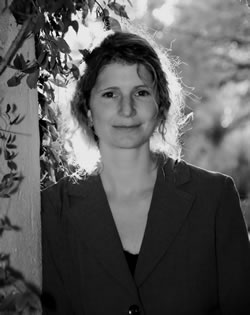|
We write in constant production, and erasure, of this question. George Oppen once said that poetry—and all literary writing written with this question at its heart is, in this sense, poetry—is "protean […] written into the future." The extremity of the outward projection that Oppen describes here, past the limits of the subjective moment and the embodiment of individual identity that that moment allows, is, I think, what permits writing to be shared. The impulse is toward a deferral of the present moment—a casting into the future—but always (necessarily) through the material act of writing, by casting it simultaneously and irrevocably into the past.
I am not sure when I knew I was, or (and what is very nearly the same thing) wanted to be a writer. I grew up in a household that esteemed storytelling and the arts, and was constantly read to as a child. It was not that the world of the imagination was the world I most identified with, but it was the world through which it made the most sense to me to explore and share my experience of this one. My mother says that she knew I was a writer when I was about three years old and I recounted to my father in detail, upon his arrival home from work one day, the story she had read to me earlier in the day—about the bear Ernest and his small mouse daughter Celestine. By the time I got to the tragic end where Celestine loses her doll in the snow I was sobbing, hardly able to speak. What had I hoped to communicate to my father when I retold him the story that had so affected me? I don't know. But I know that whatever it was, it must also be behind every story that I tell now. Something that cannot ever get truly expressed in words but can, sometimes, through the right combination of images and words, be conjured and shared.
In my latest book, This Will Be Difficult to Explain and Other Stories, I have collected nine stories with settings that range from a farm in South Dakota to museums in Paris, from small-town Nova Scotia to Hiroshima, Japan. The title story is about two siblings forced to deal with the troubling—and possibly false—recollections of their Croatian-born father; another recounts the experiences of a twelve-year-old boy on a hunting trip with his father. There is a story of a young journalist faced with his first major assignment—and its surprising results; of the strange friendship that develops between an American girl, working for the summer at a seaside resort on the Cote d'Azur, and an ex-member of the Bulgarian circus. Although some of the stories are explicitly linked by shared characters and settings (four of the stories concern a network of middle-aged women friends, all American ex-patriots living in Paris), most are not. What all nine stories share, I hope, is an impulse to question—and ultimately push past—the ordinary limits of perspective, communication and understanding. The characters are forced to confront what is, for them—for various reasons and to varying degrees—most "difficult to explain."
|


